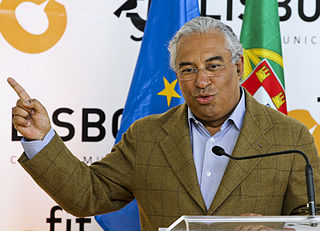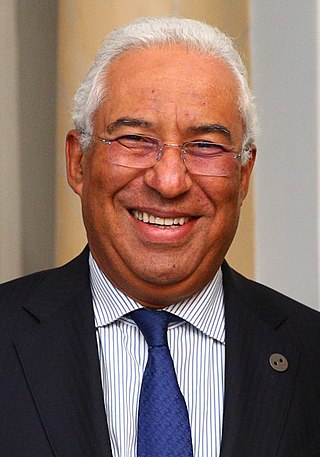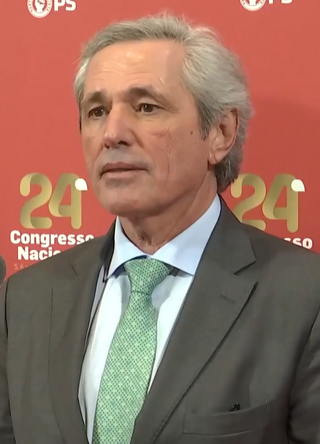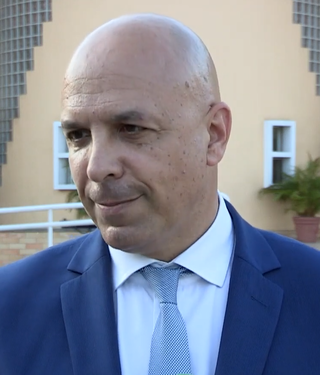
Politics in Portugal operates as a unitary multi-party semi-presidential representative democratic republic, whereby the Prime Minister of Portugal is the head of government, and the President of Portugal is the non-executive head of state with several significant political powers they exercise often. Executive power is exercised by the Government, whose leader is the prime minister. Legislative power is primarily vested in the Assembly of the Republic, although the government is also able to legislate on certain matters. The Judiciary of Portugal is independent of the executive and the legislature. The President exerts a sort of "moderating power", not easily classified into any of the traditional three branches of government.

The 2004 European Parliament election in Portugal was the election of MEPs representing Portugal for the 2004-2009 term of the European Parliament. It was part of the wider 2004 European election. In Portugal the election was held on 13 June.

The 1991 Portuguese legislative election took place on 6 October. The election renewed all 230 members of the Assembly of the Republic. There was a reduction of 20 seats compared with previous elections, due to the 1989 Constitutional revision.

The 1999 European Parliament election in Portugal was the election of MEP representing Portugal constituency for the 1999–2004 term of the European Parliament. It was part of the wider 1999 European election. In Portugal the election was held on 13 June.

The 1989 European Parliament election in Portugal was the election of MEP representing Portugal constituency for the 1989-1994 term of the European Parliament. It was part of the wider 1989 European election. In Portugal the election was held on 18 June.

The Portuguese Autonomous Regions of Azores and Madeira held their own Regional Legislative election of 1996 on October 13.

The Portuguese Autonomous Regions of Azores and Madeira held their own Regional Legislative election of 2000 on October 15.

A regional election was held in Madeira on 9 October 2011, to determine the composition of the Legislative Assembly of the Autonomous Region of Madeira. In the election, the Social Democratic Party, led by Alberto João Jardim, who has been in power since 1978, archived, once again, an absolute majority.

The 2015 Portuguese legislative election was held on 4 October. All 230 seats of the Assembly of the Republic were in contention.

The Azores Regional Election (1996) was an election held on 13 October 1996 for the legislative assembly and government of the Portuguese autonomous region of the Azores.

The Azores Regional Election, 2000 was an election held on 15 October 2000 for the legislative assembly and government of the Portuguese autonomous region of the Azores, in which the Socialist Party, under the leadership of Carlos César received 49% of the votes, and got an absolute majority, in comparison to their direct rivals, the Social Democratic Party with 32%. Voter turnout was the lowest til then with just 53.3% of the electorate casting their ballot on election day.

Miguel Filipe Machado de Albuquerque is a Portuguese politician of the Social Democratic Party (PSD) and the current President of the Regional Government of Madeira. He took office as leader of the PSD of Madeira on 10 January 2015. He was a former mayor of Funchal, Madeira. Albuquerque likes gardening and used to grow many types of roses in his Rose Garden and the Quinta do Arco.

The 2008 Azorean regional election was an election held on 19 October 2008 for the legislative assembly and government of the Portuguese autonomous region of the Azores. in which the Socialist Party, under the leadership of Carlos César won a third mandate with 46.7% of the turnout, while their rivals, under the Social Democratic Party leader Carlos Costa Neves, received 30.27% of the vote: the result would result Neves' resignation in the following days.

A regional election was held in Madeira on 29 March 2015, to determine the composition of the Legislative Assembly of the Autonomous Region of Madeira. The election was the first in which the former President of the Region, Alberto João Jardim, was not on the ballot as he earlier stated that he would step down as President and leader of the PSD-Madeira in January 2015. On 29 December 2014, the PSD-Madeira elected Miguel Albuquerque as the new president of the party's regional section. After winning the presidency, Albuquerque stated that he would not assume the Presidency of the Government without an election, so Alberto João Jardim asked President Aníbal Cavaco Silva to dissolve the Parliament and call an election, which was scheduled for 29 March.

Regional elections were held on 22 September 2019 to determine the composition of the Legislative Assembly of the Autonomous Region of Madeira in Portugal. All 47 members of the Assembly were up for election.

The Madeira Regional Election (1996) was an election held on 13 October 1996 for the legislative assembly and government of the Portuguese autonomous region of the Madeira

The 2000 Madeira Regional Election was an election held on 15 October 2000 for the legislative assembly and government of the Portuguese autonomous region of the Madeira. There were 61 seats in dispute, two more than in the previous election, distributed by the 11 municipalities of the archipelago proportionally to the number of registered voters of each municipality.

The Azores Regional Election, 2004 was an election held on 17 October 2004 for the legislative assembly and government of the Portuguese autonomous region of the Azores, in which the Socialist Party, under the leadership of Carlos César won 57% of the votes, and got an absolute majority, for the 2nd consecutive turn. The Social Democratic Party ran in a coalition with the People's Party, called Azores Coalition, but was massively defeated gathering just 37% of the votes.

A regional election was held in Madeira on 6 May 2007, to determine the composition of the Legislative Assembly of the Autonomous Region of Madeira. The election was a snap election, as it was original schedule to only happen in October 2008. The election was called after the President of the Regional Government, Alberto João Jardim, resigned after his government clashed with the Socialist Prime Minister José Sócrates due to the new regional finance law approved by the Sócrates government. Jardim defended that the new law was harmful for Madeira's interests. By this time, the Social Democratic Party (PSD) had been in power, nonstop, since 1976.

Early legislative elections were held on 30 January 2022 in Portugal to elect members of the Assembly of the Republic to the 15th Legislature of the Third Portuguese Republic. All 230 seats to the Assembly of the Republic were up for election.















